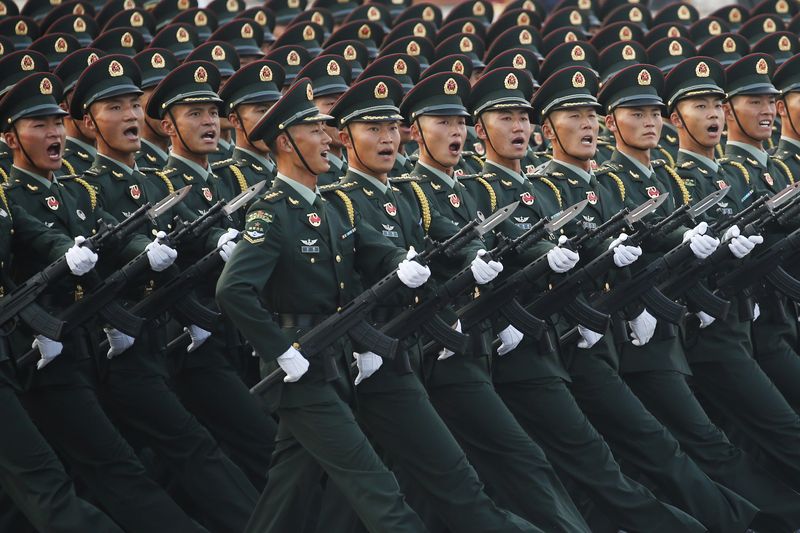By Yew Lun Tian and Laurie Chen
BEIJING (Reuters) - China will boost its defence spending by 7.2% this year, fuelling a military budget that has more than doubled under President Xi Jinping's 11 years in office as Beijing hardens its stance on Taiwan, according to official reports on Tuesday.
The increase mirrors the rate presented in last year's budget and again comes in well above the government's economic growth forecast for this year.
China also officially adopted tougher language against Taiwan as it released the budget figures, dropping the mention of "peaceful reunification" in a government report delivered by Premier Li Qiang at the opening of the National People's Congress (NPC), China's rubber-stamp parliament, on Tuesday.
Tensions have risen sharply in recent years over Taiwan, the democratically ruled island that China claims as its own, and elsewhere across East Asia as regional military deployments rise.
Li Mingjiang, a defence scholar at the Rajaratnam School of International Studies (RSIS) in Singapore, said that despite China's struggling economy, Taiwan is a major consideration in Beijing's defence spending.
"China is showing that in the coming decade it wants to grow its military to the point where it is prepared to win a war if it has no choice but to fight one," Li said.
Since Xi became president and commander-in-chief more than a decade ago, the defence budget has ballooned to 1.67 trillion yuan ($230 billion) this year from 720 billion yuan in 2013.
The percentage rise in military spending has consistently outpaced the annual domestic economic growth target during his time in office. This year the growth target for 2024 is about 5%, similar to last year's goal, according to the government report.
The defence budget is closely watched by China's neighbours and the United States, who are wary of Beijing's strategic intentions and the development of its armed forces.
Based on data from the London-based International Institute for Strategic Studies (IISS), this year's budget marks the 30th consecutive year of Chinese defence spending increases.
Japanese government spokesperson Yoshimasa Hayashi on Tuesday urged greater openness from Beijing, warning of serious international concerns.
China's continuous military spending increases without sufficient transparency were "the greatest strategic challenge ever to ensure the peace and stability of Japan and the international community and strengthen international order", Hayashi said in Tokyo.
South Korea's defence ministry declined to comment. Australia's defence ministry did not immediately respond to a request for comment.
James Char, a security scholar at the RSIS, said that despite the defence budget's outpacing GDP growth, it had remained at about 1.3% of overall gross domestic product in the last decade and had put no stress on the national coffers.
"Of course, the country's longer-term economic fortunes will determine whether this can be sustained going forward," Char said.
The purchase of new equipment is likely to take up the largest single chunk of the budget as the military works to meet Xi's goal of full modernisation by 2035, the IISS said in research published last month.
That push continues across several fronts, with China producing weapons ranging from warships and submarines to drones and advanced missiles that can be equipped with both nuclear and conventional warheads.
Char said tighter management would also be a priority for military leadership after high-profile personnel purges related to weapons procurement.
The Central Military Commission, China's top military body, last July ordered a "clean up" of the procurement process and invited the public to report irregularities.
The commission has not announced the results of its investigation, but at least nine generals, including four directly in charge of procurement, have been stripped of their title as parliamentarians, a necessary procedure before they can be charged in court.
Two former defence ministers, Li Shangfu and Wei Fenghe, have also gone missing without explanation, which in China often means they are under investigation.
Li had been in charge of military procurement from 2017 to 2022. When asked whether Li would attend the parliament sessions, parliament spokesman Lou Qinjian told Singapore paper Lianhe Zaobao on Monday that Li "cannot attend because he is no longer a delegate".
In the government work report, China reiterated a call for "reunification" with Taiwan, but added emphasis that it wants to "be firm" in doing so and dropped the descriptor "peaceful", which had been used in previous reports.
Although it is not the first time that China had omitted the word "peaceful", the change in language is closely watched as a possible sign of more assertive stance towards Taiwan.
Taiwan's Mainland Affairs Council on Tuesday urged China to accept the fact that the two sides are not subordinate to each other, and urged China to create health cross-strait exchanges.
The island's defence minister had said on Tuesday Taiwan's armed forces would increase the number of missile drills they hold this year.
Wen-Ti Sung, a political scientist and fellow at the Atlantic Council, said that the language on Taiwan has "moderately hardened".
"Beijing appears to be balancing between projecting increased toughness on Taiwan with stabilising relations with Taiwan's international friends," he said.
After the Democratic Progressive Party's Lai Ching-te won the presidential election in Taiwan, the Chinese Communist Party's fourth-ranked leader, Wang Huning, said at a high-level Taiwan policy meeting last month that China would "resolutely combat" any efforts towards Taiwan independence this year.

Previous statements from the annual meeting only vowed to "resolutely oppose" Taiwan independence.
($1 = 7.1987 Chinese yuan renminbi)